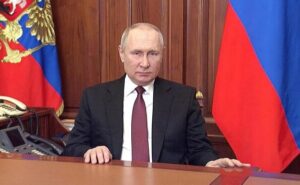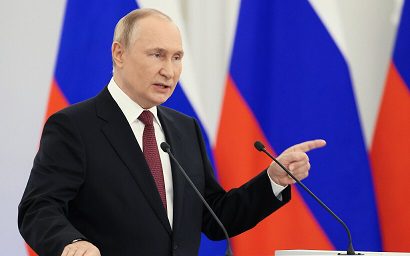Unmasking Wagner: Putin recently claimed that the Wagner mercenary group does not exist. The group’s true nature and Kremlin involvement are unclear after this declaration. Putin revealed intriguing Wagner group divisions in a Kommersant interview. We’ll examine Putin’s claim, Russia’s legal framework for private military companies, and the Kremlin’s complicated relationship with Wagner.
The Wagner group’s armed uprising revealed flaws in Russia’s one-man rule. The Kremlin responded with a robust PR campaign to portray Putin’s unwavering control. Putin’s narrative is questioned by Wagner’s legitimacy.
Putin revealed Wagner PMC does not exist in the interview. He blamed Russia’s lack of private military organization laws. He is technically correct, as Article 359 of Russia’s Criminal Code prohibits mercenary activities and imposes severe penalties for recruiting, training, financing, or supporting them in armed conflicts or military operations. Putin acknowledged the complexity of the issue and the need for private military company regulation.
This legalistic response only raises more questions than answers. The Kremlin vehemently denied Wagner’s existence until last year’s full-scale invasion of Ukraine. However, Wagner’s symbolic victories, such as the intense fighting around Bakhmut in Ukraine, showed their involvement. State TV made Wagner fighters rock stars. Who gave Wagner permission? Who funded, trained, and equipped them? Who approved their large budget?
Wagner’s enigma transcends law and philosophy. It highlights Putin’s post-truth approach. Denial is nothing new. Putin later admitted Russian special forces occupied Crimea. Russia’s covert support for Donbas separatists followed the same pattern. Despite Putin’s sly admissions in interviews and press conferences, the Kremlin continued to deny that regular Russian forces supported the separatist republics.
Wagner leader Yevgeny Prigozhin, like Putin, has a history of lying. Prigozhin denied that his St. Petersburg “troll farm”the Internet Research Agencymeddled in the 2016 US elections. After Russia invaded Ukraine, he admitted to founding and running the agency. This raises questions about Prigozhin’s Wagner involvement and credibility.


READ MORE: King Charles III and President Biden Forge: Historic Alliance at Windsor Castle
Putin’s narrative divides the Wagner group. He divides Wagner into “good” (foot soldiers) and “bad” (Prigozhin). Putin told Wagner commanders that the mercenaries could fight under their direct commander, known as “Sedoy” (meaning “Grey hair”). Fighters would remain unchanged under this alternative. Putin said many group members supported this idea. Putin claims Prigozhin disagreed.
This rift’s reality is unknown. Wagner’s rank and file and the Kremlin’s use of this division are unknown. Putin’s one-sided account suggests the Kremlin is still trying to understand Prigozhin’s role in the group.
The Wagner mercenary group remains a mystery as the pieces of this complex puzzle slowly fit together. Putin’s claims, Wagner’s dynamics, and the Kremlin’s decisions will shape this mysterious organization. Wagner’s role in Russia’s complex geopolitics will be revealed over time.

